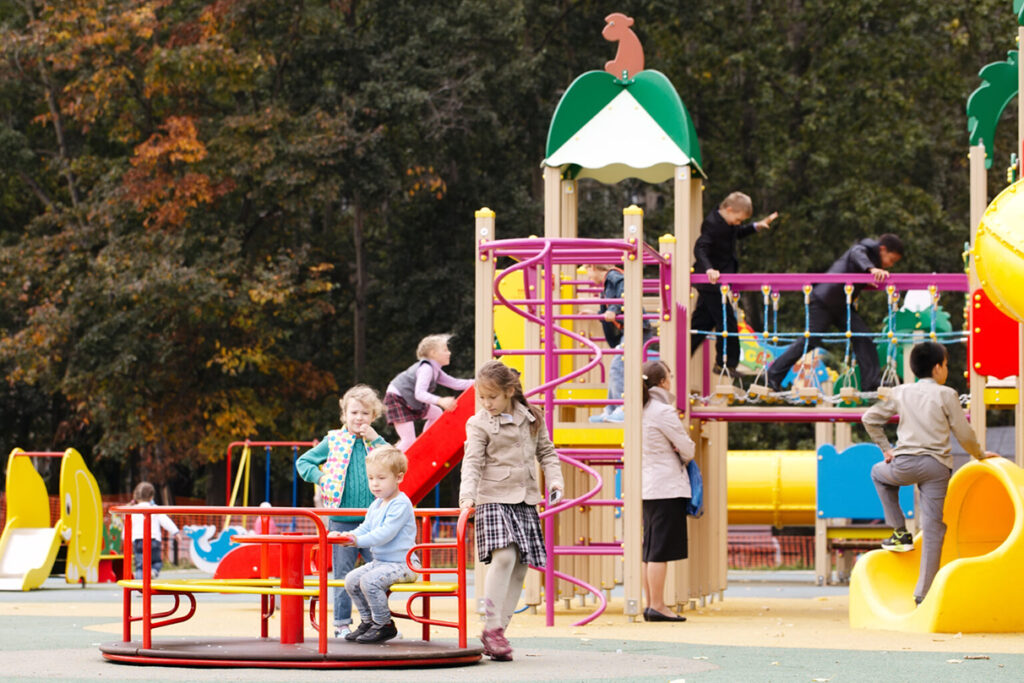As babies and young children grow and develop a sense of agency in early childhood, they realise that they can contribute to and make their own decisions and control their own lives. A child’s sense of agency is essential to a strong sense of identity. This has been identified as a foundation for learning and wellbeing and is thus critical in early childhood education.
What is agency in early childhood?
Having agency means “being able to make choices and decisions to influence events and to have an impact on one’s world.”
Making space for a child’s sense of agency to be expressed is actively encouraged and discussed in early education. Enable children to be involved in genuine choices and decisions. Provide them with opportunities to decide what they’ll do and how they’ll do it.
A child’s sense of agency in early childhood is very much linked to a sense of belonging
This sense of belonging thrives when a child has trust in the adults and carers around them. This also extends to the environment in which they are cared for.
Developing such a trusting bond with infants and children during their early years is vital. When we listen with respect to children’s voices, words and ideas, we enhance this trust, showing them that they are heard.

Listening deeply, being present and being willing to see the world through the eyes of the child are just some ways of respecting a child’s sense of agency.
All educators and early childhood education and care (ECEC) staff have a critical role in ensuring agency is promoted. This goes a long way to helping develop this sense of belonging in young children in a variety of contexts.
How can you support children in developing a sense of agency in early childhood education?
Empowerment through choice
Decision-Making Opportunities: Offer children opportunities to make age-appropriate choices in their daily activities and make decisions to influence events. This can range from selecting activities to choosing toys or deciding on which activities to participate in.
Encourage Self-Expression: Encourage children to express their opinions and preferences. This will not only support their agency but will also increase their sense of confidence and independence.
Create an inclusive and supportive environment
Acknowledging individuality—Celebrate each child’s uniqueness, recognising their diverse backgrounds, interests and abilities. Provide an inclusive culture that values and respects individuality.
Cultural sensitivity—Provide students with multicultural perspectives and cultural elements in the learning environment so that they feel valued and respected.
Nurture partnerships with families
Collaborative communication—Communicate openly and collaboratively with families and caregivers. Include them in decision-making processes and keep them updated on the child’s accomplishments.
Understanding home context—Respect the cultural and familial contexts of each child’s life. This understanding enhances the connection between the ECEC service and the child’s home.

The concept of respecting a child’s sense of agency and belonging involves making choices, creating an inclusive environment that promotes diversity, and building strong partnerships with families.
Ideas for ensuring you encourage children to exercise agency at your ECEC service
Promote agency in early childhood through play
One crucial aspect to consider is the role of play in promoting agency. Play is the primary mode through which young children explore, experiment and make sense of the world around them. By providing open-ended materials and opportunities for imaginative play, educators can empower children to take control of their learning experiences. This type of play encourages creativity, problem-solving skills and decision-making—all essential components of agency.
Furthermore, promoting agency in early childhood requires a shift in mindset. We must move from a traditional, adult-centric approach to one that values children as active participants in their own learning. This means recognising and respecting children’s ideas, interests, and contributions, no matter how small they may seem. By acknowledging children’s agency in everyday interactions, educators can help build confidence and self-esteem, laying the foundation for lifelong success.
Create opportunities to promote agency in ECEC services
Another important aspect of promoting agency is creating opportunities for children to take on leadership roles and responsibilities within the ECEC service. Whether it’s leading a group activity, helping to set up the classroom or distributing snacks, giving children meaningful roles and responsibilities helps them develop a sense of ownership and agency over their environment. This not only fosters independence and self-confidence but also teaches valuable life skills such as teamwork, communication and problem-solving.

Promoting agency in early childhood is a group effort
In addition to fostering agency within the ECEC service, involving families in the process is essential. Parents and caregivers play a crucial role in supporting children’s agency at home. This can reinforce the principles of autonomy, choice and self-expression learned at your service. By fostering open communication and collaboration between educators and families, ECEC service admins can create a seamless transition between home and ECEC services, ensuring continuity in children’s experiences and reinforcing their sense of agency.
Moreover, promoting agency in early childhood extends beyond the individual child to the broader community. By actively engaging with the local community, ECEC services can provide children with opportunities to contribute to and positively impact their surroundings. This could involve participating in community events, collaborating with local organisations, or even undertaking community-based projects. By connecting children to their community and encouraging them to become active citizens, ECEC services can help instil a sense of agency and social responsibility from a young age.

Understanding the role of educators in fostering agency
Educators in ECEC services play a pivotal role in fostering agency in young children. Educators need to understand their role in creating an environment where children feel empowered to make choices and express themselves. Here are some key strategies educators can employ to promote agency in early childhood:
Provide guidance without control
Educators should aim to provide guidance and support to children without imposing control over their choices. This means offering options and opportunities for decision-making while respecting children’s autonomy and preferences. For example, don’t dictate how a particular activity should be done. Offer suggestions and let children explore different approaches independently.
Create a safe and supportive environment
A nurturing and inclusive environment is essential for promoting agency in early childhood. Educators should create a space where children feel safe expressing themselves and taking risks. This involves fostering positive relationships, practising active listening, and validating children’s feelings and experiences. When children feel supported and valued, they are more likely to develop a sense of agency and confidence in their abilities.
Encourage reflection and self-expression
Reflection is a critical component of agency, allowing children to evaluate their choices and experiences. Educators can encourage reflection by enabling children to openly share their thoughts and feelings. This could involve group discussions, journaling activities, or reflective prompts during circle time. By encouraging self-expression and reflective thinking, educators help children develop a deeper understanding of themselves and their actions.
Foster a growth mindset
A growth mindset is essential for promoting agency in early childhood. Educators should praise children’s efforts and persistence rather than focusing solely on outcomes. Celebrate mistakes as learning opportunities and emphasise the importance of effort and resilience. This helps children develop a positive attitude towards challenges and setbacks. This fosters a sense of agency by empowering children to believe in their ability to learn and grow.
Empower children through play
Play is a powerful tool for promoting agency in early childhood. It allows children to explore and experiment with different roles and identities. Here are some ways educators can empower children through play.
Provide open-ended materials
Open-ended materials such as blocks, loose parts, and art supplies encourage creativity and imagination. By offering materials that can be used in multiple ways, educators empower children to take ownership of their play experiences and express themselves freely.
Support child-led play
Child-led play allows children to take the lead in their play experiences, fostering a sense of agency and autonomy. Educators can support child-led play by observing children’s interests and following their lead. This involves stepping back and allowing children to take control of the play narrative while providing support and guidance as needed.
Create play spaces that reflect children’s interests
The environment plays a crucial role in supporting agency in play. Educators and playworkers should design play spaces that reflect children’s interests, preferences and cultural backgrounds. This could involve setting up themed play areas, incorporating natural elements, or displaying children’s artwork and creations. By creating a space that feels welcoming and familiar, educators encourage children to engage in meaningful play experiences that reflect their agency and identity.

Everyone benefits from promoting agency in early childhood
Promoting agency in early childhood is essential for supporting children’s overall development and well-being. By fostering a sense of autonomy, self-expression, and empowerment, educators help children develop the skills and confidence they need to navigate the world around them. Through intentional guidance, nurturing environments, and opportunities for play, educators can empower children to become active participants in their own learning journey, setting them up for success in school and beyond.
Respecting a child’s sense of agency and belonging involves:
- Empowering them through choices.
- Creating an inclusive environment that celebrates diversity.
- Establishing strong partnerships with families to ensure a holistic approach to their development.
Promoting agency in early childhood is not only about allowing children to make choices and decisions; it’s about fostering an environment where they feel empowered, respected, and valued. As ECEC service admins, it’s crucial to understand the multifaceted nature of agency and how it influences every aspect of a child’s development.
If you’re looking for ways for educators, ECEC staff and families to collaborate on how to help children exercise agency in early childhood, Xplor Education’s dynamic duo of Playground (educators) and Home (families) work seamlessly together to streamline family engagement.
If you’d like to learn more about how Xplor Education’s all-in-one ecosystem can help you with compliance and streamlining admin, please contact us for a free, personalised demo.

You might also be interested in…

Blog
How To Give Children Proper Praise
Giving children proper praise is essential for encouragement and to be effective. Parents and teachers frequently use words of encouragement ….
Read more

Blog
How Educators Can Foster Better Relationships with Children
Quality Area 5 of the National Quality Framework focuses on fostering relationships with children to maintain sensitive and respectful connections ….
Read more

Blog
Circle of Security concepts and building strong relationships
Evidence needs to guide every decision we make in the education and care sector. And now, more than ever, research findings ….
Read more

by Dean Comeau (Marketing Team Lead)
-
First published: 18 February 2022
Written by: Dean Comeau
